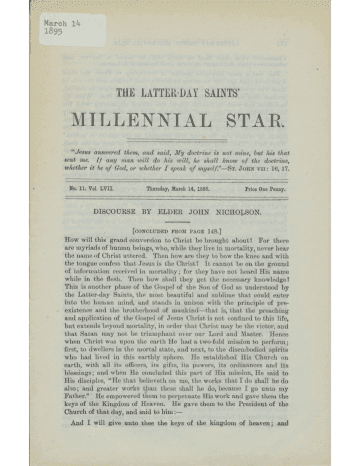Magazine
An Objection Answered

Title
An Objection Answered
Magazine
The Latter Day Saints' Millennial Star
Publication Type
Magazine Article
Year of Publication
1895
Authors
Booth, A.L. (Primary)
Pagination
168–169
Date Published
14 March 1895
Volume
57
Issue Number
11
Abstract
Booth defends criticisms that the Book of Mormon contains bad grammar by stating that any errors of the book are the errors of man. Mentions the errors of the Bible.
AN OBJECTION ANSWERED.
The preface to the Book of Mormon contains the following very striking statement: “Written by way of commandment and also by the Spirit of revelation. * * * And now if there are faults they are the mistakes of men: wherefore condemn not the things of God, that ye may be found spotless at the judgment-seat of Christ.”
When the world shall have settled down to a calm, dispassionate and unprejudiced investigation of the claims which the Book of Mormon and its friends make for it, there will be found many interesting incidents connected with its history since it was first published. Scores of men have written against it and numerous theories have been put forth as to its origin, but. all these writings and all these theories have been subsequently abandoned. Every year is adding proof of a scientific nature to the truth and inspiration of that record; yet men shut their eyes and will not see in the discoveries made any evidence in favor of it. The claim that it was delivered by an angel from heaven is too great for men to accept; an admission of this would carry with it the idea that revelation is given in our own day, and it would further imply that any church that denies revelation is not the church of God.
Among the numerous objections that have been urged against this book is this, that the grammar in it is imperfect; and, say the objectors, inasmuch as it was translated by the power of God, how is this possible? There is no doubt that the writer of the quotation above given saw this very objection through the gift of prophecy when he said, “condemn not the things of God.” This same argument 1ms been used against the Bible by atheistical writers. The Bible, however, has withstood all the attacks of its enemies, and the Book of Mormon will do the same.
The testimony of the witnesses is not that the grammar in the Book of Mormon is correct, but that the translation from the plates was made by the gift and power of God and is therefore perfect. Some of the writers in the book stated that they were not well educated in the language of the record, and it is possible that the construction of their sentences was not always perfect. Their ideas were inspired, while the expression of them was their own. A correct translation would carry with it any of these defects in language which existed in the original record, otherwise the translation could not be called entirely correct. There are mistakes of this character in the Bible as well as in the Book of Mormon.
Notwithstanding a few grammatical imperfections, there is no sentence in the Book of Mormon the meaning of which is not clear. Principles of the Gospel are explained in such a simple manner that a child can comprehend them. There is no chance for spiritualizing the Book of Mormon doctrines; they are as plainly to be seen as objects at noon-day. This simplicity is of much greater importance to a person seeking for salvation than any other consideration. The grammar might be faultless and the rhetoric perfect, yet the meaning could be very ambiguous and hence not beneficial to the understanding of men. The simple language of the Bible has been the admiration of all generations since it was written, and is to-day looked upon as a model; why will not the same principles apply in favor of the Book of Mormon? Among all the criticisms offered against this book we have never heard it said that it was hard to understand.
The Latter-day Saints do not contend over the meaning of passages in the Book of Mormon, because there is no room for contention. A person who rejects it and the testimony of the Gospel which it bears does so at his own peril. He it is who is warned not to condemn the things of God because of man’s imperfections.
What will be the standing, in the day of judgment, of a man who should be asked, did he obey the Gospel as taught by the Savior, and his answer should be that he did not know it was on the earth during his lifetime? Did he read the Book of Mormon? He read part of it, or perhaps all of it, but could not accept it because of two or three little grammatical errors which it contained. Did they take away any of its clearness, or obsure its meaning? No, but he thought the record of God should be free from all these. Was he not told in the beginning of the book that all such faults were due to the mistakes of men? Was not the warning given that he should not reject the things of God for any such flimsy reason? The testimony of the witnesses of the Book of Mormon is that the translation was made by the gift and power of God, which testimony he had read. Will not such a person be left without excuse, and counted among the unbelievers? B.
Subject Keywords
Bibliographic Citation
Terms of use
Items in the BMC Archive are made publicly available for non-commercial, private use. Inclusion within the BMC Archive does not imply endorsement. Items do not represent the official views of The Church of Jesus Christ of Latter-day Saints or of Book of Mormon Central.